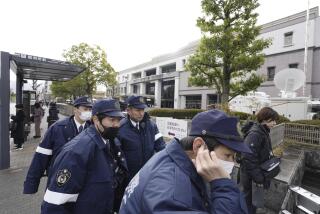Gunman Kills Reporter Inside Newsroom : Assailant Seriously Injures Second Writer During Attack in Japan
- Share via
TOKYO — Police in western Japan today searched for the man who burst into a regional office of a Tokyo newspaper and opened fire with a shotgun on its reporters, killing one and seriously wounding another.
Investigators were baffled as to the motive but said the shooting did not appear to be random. The case drew immediate nationwide attention in Japan, where firearms are virtually banned from private ownership and gunshot slayings are rare.
Initial speculation centered on threats received by the slain reporter, Tomohiro Kojiri, last year after he wrote a story critical of tactics used by police against Japan’s Korean minority.
The shooting occurred Sunday night at a regional bureau of the Asahi Shimbun, one of the country’s leading dailies, in Nishinomiya, outside the city of Kobe about 300 miles southwest of Tokyo.
As Kojiri, 29, and two other reporters sat in the second-floor office, a ski-masked man burst in and opened fire at close range with a shotgun, police said. Kojiri died of his wounds early today in a hospital.
Hyoe Inukai, 42, was in critical condition with a chest wound after surgery. The third reporter escaped unharmed when the assailant, after firing twice, fled on foot and vanished.
Speculation in local media that the shooting was linked to Kojiri’s police reporting prompted the Asahi’s regional bureau chief, Jiro Oshima, today to deny any suspicion that police had retaliated. He said he was “dumbfounded” as to the reason.
Last November, Kojiri reported that Hyogo Prefecture police forced a Korean resident to comply with an unpopular fingerprinting law by clamping his arms into a brace and forcibly printing him.
All non-Japanese are fingerprinted periodically under the country’s alien registration law--including the 670,000 Korean residents, many of whom have lived all their lives in Japan. Many Koreans refuse to be fingerprinted and are leading protests against the law as discriminatory.
More to Read
Sign up for Essential California
The most important California stories and recommendations in your inbox every morning.
You may occasionally receive promotional content from the Los Angeles Times.













